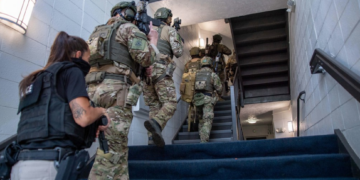Support for increasing New York”™s minimum wage has grown among business advocacy groups and business owners and executives statewide in the closing weeks of a legislative session in Albany where a wage-hike bill, lacking strong public support from the governor, could die in the Senate.
Historically unpopular in the business community, the latest proposed wage hike still is strongly opposed by several business and trade lobbying groups in Albany, among them the Business Council of New York State, the state office of the National Federation of Independent Business, Unshackle Upstate and New York Farm Bureau.
In Westchester County, the wage hike has not been a high-priority issue for the two largest business groups here, The Business Council of Westchester and Westchester County Association. Neither has taken a position on the bill passed by the Democrat-controlled Assembly in May, which would raise the state”™s minimum hourly wage from $7.25 to $8.50 on Jan. 1, 2013. The minimum wage in future years would be pegged to the annual inflation rate.
To become law, the bill also requires passage by the Republican-controlled Senate before the legislative session ends June 21. That, however, might not be “in the realm of the possible,” Gov. Andrew Cuomo said in a recent radio interview.
“I support the concept of a minimum wage increase,” Cuomo was quoted in the May 21 interview. “The Senate feels quite strongly about their position.”
Senate Majority Leader Dean G. Skelos, the Long Island Republican, “has said we will not be taking up that bill in the Senate,” said Skelos spokesman Scott Reif. “He has concerns, like many in the business community, about this legislation hurting New York”™s ability to create jobs, which is what we believe should be the priority now.”
The Senate version of the bill was sponsored by Sen. Jeffrey Klein, a member of the Senate”™s Independent Democratic Conference, whose 34th district includes the Bronx and parts of Westchester. Klein said that putting more money in the pockets of minimum wage earners would spur demand for additional jobs.
Klein released a report, prepared with the nonpartisan Economic Policy Institute, that found the $8.50 wage will boost the wages of affected workers by roughly $950 million, of which $600 million will be almost immediately spent on goods and services. That economic activity is expected to spark the creation of an estimated 5,200 new full-time jobs and add approximately 4,800 new workers to employer payrolls statewide.
“Raising the minimum wage is not only the right thing to do for the thousands of New Yorkers who are struggling to make ends meet every week, it also benefits New York state as a whole,” Klein said when introducing the Senate bill.
Opponents, though, claim the wage increase will add to the financial burdens of small business owners and result in lost jobs for low wage earners.
Heather Bricetti, president and CEO of the state Business Council, said the Assembly in approving the hike “has taken a step in the wrong direction.” She said the $8.50 wage would cost employers an extra $2,900 for a full-time employee. Bricetti cited “recent studies” that show “that raising the minimum wage would result in lost jobs and a reduction in training opportunities for low-income employees.”
Mike Durant, state director for the National Federation of Independent Business, said New York”™s small business owners have said a minimum wage increase would be “devastating.” The bill”™s Assembly supporters “are making a very unfortunate mistake for which struggling small businesses and entry-level job seekers are going to pay a high price.”
Yet a spring campaign in support of the wage hike, organized by Business for Shared Prosperity, has been joined by several large companies, national and regional business groups and more than 200 small business owners in New York. The list includes Costco, the Greater New York Chamber of Commerce, the American Sustainable Business Council and, in Irvington, Eileen Fisher Inc.
Eileen Fisher, the women clothing company”™s founder and chief creative officer, in a press release announcing the Business for a Fair Minimum Wage campaign, noted the “enormous contribution” of New York City factory workers to her 28-year-old company”™s fabrics production. Raising the state”™s minimum wage “would be a step on the path to acknowledging the positive difference they make in the success of our company and all brands who engage local labor in their supply chains.”
As the legislative session winds down, the minimum wage increase has broad support among New Yorkers, according to a Quinnipiac University poll conducted in late May. Voters supported the wage hike by a 79-18 percent margin. Among Republicans, 61 percent favored increasing wages.
More poll respondents thought the hourly minimum should be set higher than $8.50, compared with those supporting the Assembly-approved increase. And 51 percent of respondents did not think small businesses will reduce hiring if the minimum wage is raised, compared with 41 percent who agreed with wage hike opponents that jobs will be lost.
At The Business Council of Westchester, “We haven”™t taken a position,” said Executive Vice President and Chief Operating Officer John Ravitz, “but we recognize the fact that the present minimum wage doesn”™t work in Westchester for employees. When you look at the cost of living in Westchester County, we”™re realistic that this has to be addressed.”
A wage increase “could be a hardship” for small businesses in the county, Ravitz said.
At the Westchester County Association, “I don”™t see it as a big issue here,” said President William M. Mooney Jr. In an affluent county where large corporations and mid-sized companies do business, a minimum-wage increase “is not a big deal,” he said. “There”™s no pushback against something like that here.”
Mooney said he has heard more support for a wage hike this spring than in previous years. “I think everybody is more appreciative of somebody else”™s plight than they were a few years ago,” he said.

















Comments 1